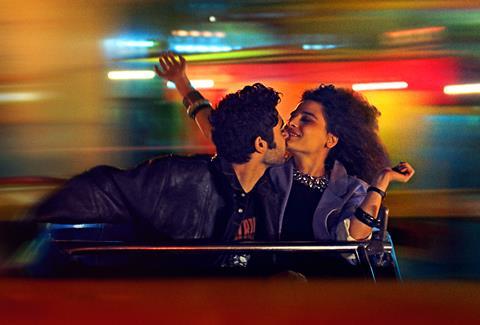A tale of truth and reconciliation from 1980s Lebanon

Dirs: Joana Hadjithomas, Khalil Joreige. France/Lebanon/Canada/Qatar. 2021. 102 mins
The past is an emotional minefield for three generations of women in Memory Box. Freely adapted from elements of co-director Joana Hadjithomas’s life, the film overcomes a conventional set-up and framework to blossom into an imaginative and touching evocation of her Beirut adolescence in the 1980s. Further festival attention is sure follow the Berlinale premiere with a target audience among those who have embraced other tales of life in Lebanon from the couple’s earlier I Want To See (2007) to Caramel (2008).
A vibrant, technically impressive approach to bringing personal material alive.
Memory Box begins in a snowbound Yuletide Montreal. Fifteen year-old Alex (Paloma Vauthier) is marooned at home waiting for the return of her mother Maia (Rim Turkhi). Her grandmother Teta (Clemence Sabbagh) is preparing food for the holiday season. “You can judge a man by how he eats vine leaves,” is among the wisdom she dispenses.
A large box is delivered from the estate of Maia’s childhood friend Liza. Teta insists that they hide it in the cellar until after Christmas as it will only prove upsetting. Teta already knew about the friend’s death but has said nothing and it becomes apparent that this is a family where secrets are the norm.
Inevitably, Alex cannot resist exploring the contents of the box. She discovers a treasure trove of notebooks, letters, photographs, contact sheets and audio tapes that the young Maia in Lebanon sent to her friend after the latter had departed for a new life in France. This is the point where the film comes into its own. Using Hadjithomas’s own correspondence between 1982 and 1988 and Joreige’s photos, the filmmakers take a vibrant, technically impressive approach to bringing the material alive. Footage is degraded and scratched. Images become short narratives reminiscent of the photo stories in teen magazines of the period. Other sequences have the stylised look of an A-Ha pop video. The soundtrack is suitably evocative as it ranges from Blondie to Sigue Sigue Sputnik, Visage and Killing Joke.
Split screen, sharply-cut montage sequences and dramatised recreations are celeverly combined to convey a vivid portrait of a young woman eager to embrace’s life and find romance. The handsome, brooding Raja (Hassan Akil) is her first love and their times together have a giddy, appealing, fairground-ride energy. Once Beirut becomes a more dangerous city with power cuts, gun fire and bombings, Maia’s dispatches grow more poignant esepcially when the family is visited by multiple tragedies.
The modern day wraparound story can’t help but feel obvious and less engaging compared to the authenticity and immediacy of Hadjitohmas’s own experiences in the 1980s. You are left wondering if the whole film might have worked better with the emphasis tilted more towards documentary than drama.
Ultimately, the impact of the past does heighten the emotional stakes in the contemporary mother-daughter story. A joint trip to Beirut captures sun-bathed images of a city that has rebuilt and endured. As truths are shared, revelations uncovered and reunions achieved, Memory Box becomes a warming tale of truth and reconciliation.
Production companies: Haut Et Court, Abbout Productions, micro-scope
International sales: Playtime info@playtime.group
Producers: Georges Schoucair, Christian Eid, Carole Scotta, Barbara Letellier, Kate McCraw, Luc Dery, Jasmyrh Lemoine
Screenplay: Gaelle Mace, Joana Hadjithomas, Khali Joreige
Editing: Tina Baz
Cinematography: Josee Deshaies
Prod des: Mary Lynn Deachman, Franckie Diago, Maia El Khoury
Music: Rhadwan Gazi Moumneh
Main cast: Rim Turkhi, Manal Issa, Paloma Vauthier, Clemence Sabbagh

























No comments yet